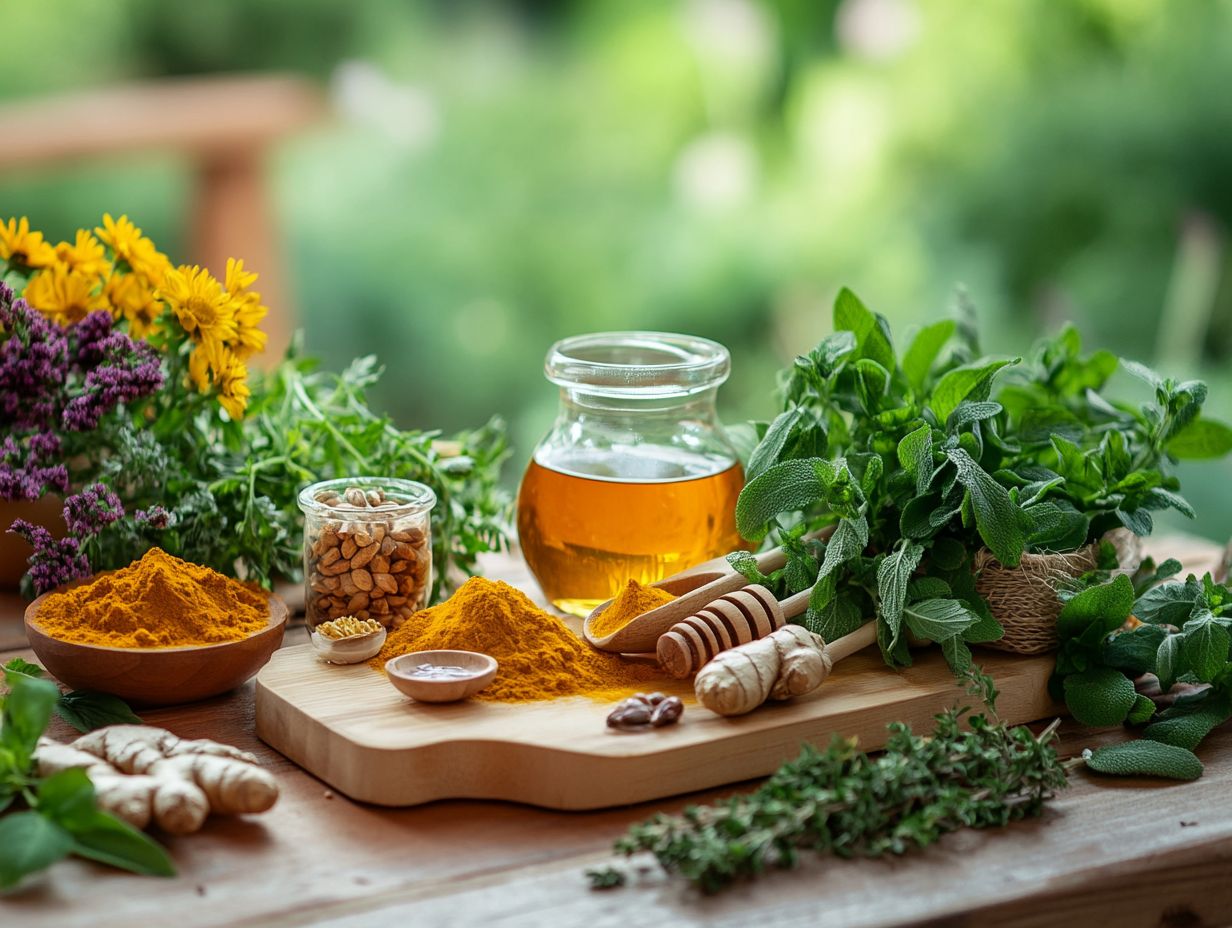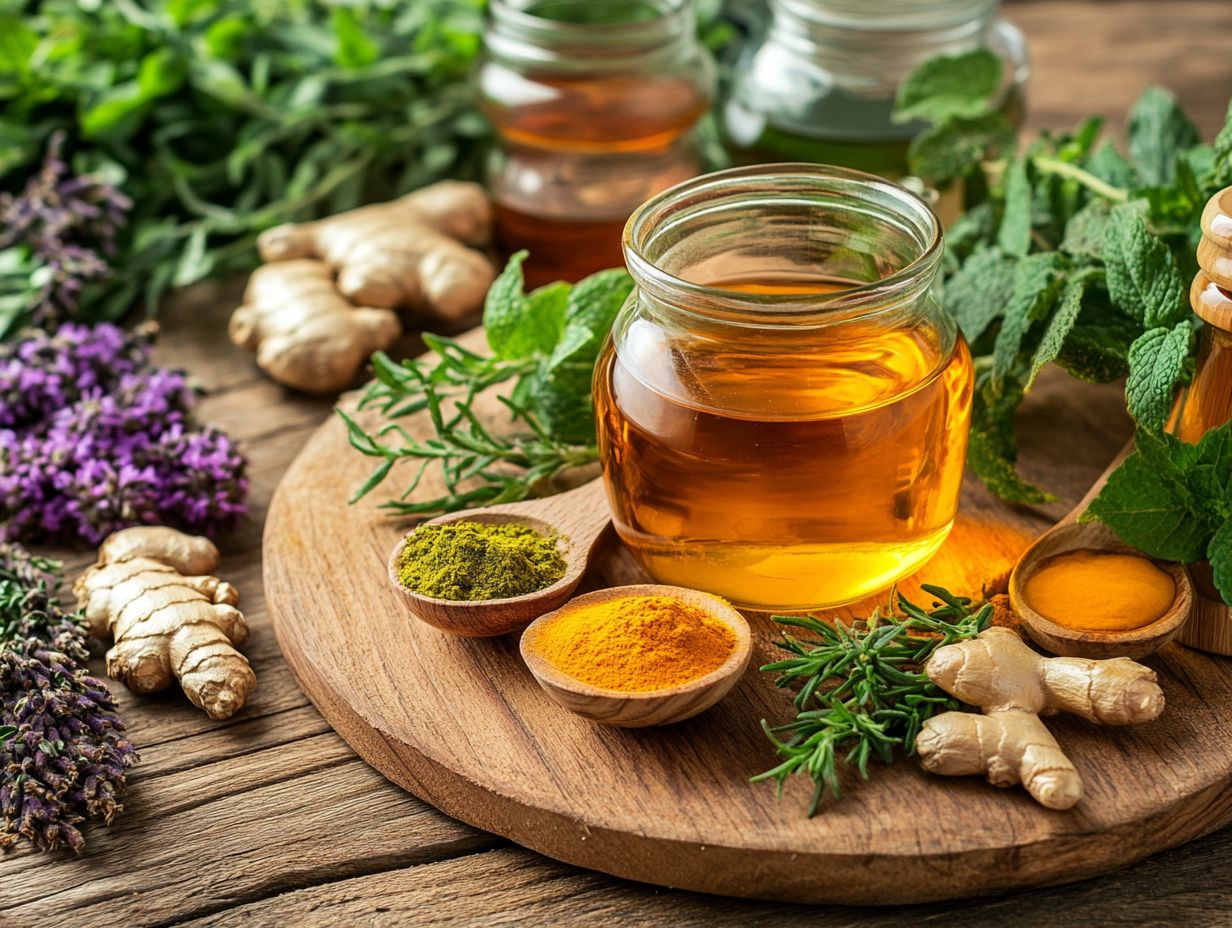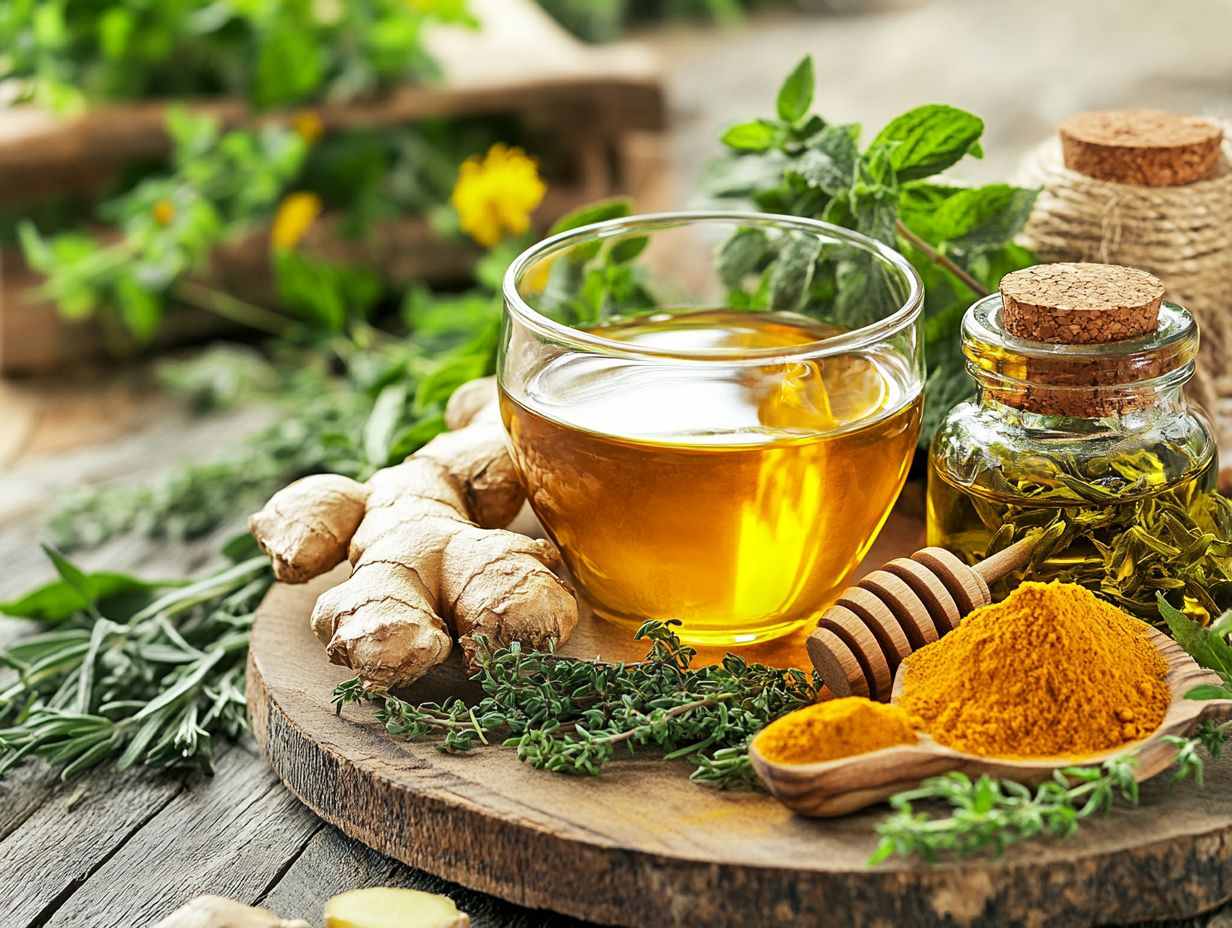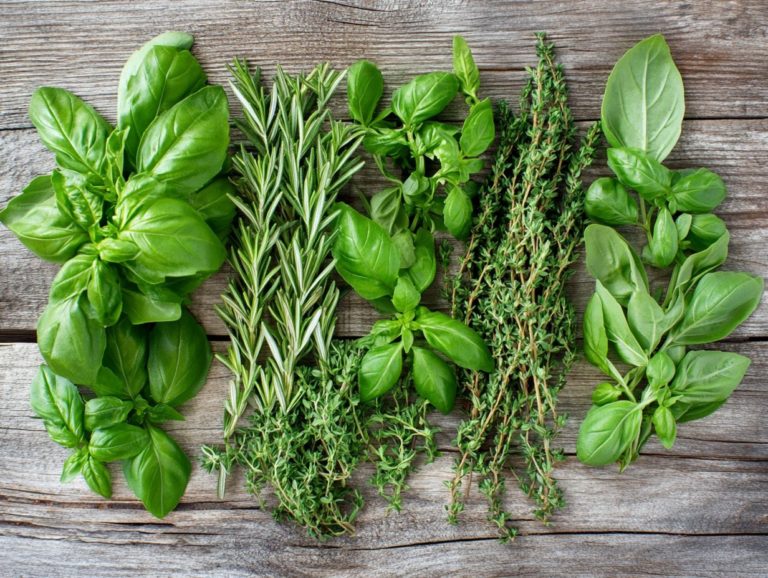Natural Remedies for Arthritis Pain
Arthritis can be a debilitating condition, impacting millions around the globe and bringing chronic pain and discomfort into daily life.
In this article, you ll explore the various types of arthritis and their common symptoms. You will gain valuable insight into how they can influence your everyday activities.
You will discover effective natural remedies, including herbal supplements and lifestyle changes, that can help alleviate your pain.
The discussion will also cover the crucial roles of diet, exercise, and physical therapy in managing arthritis effectively.
You ll learn when to seek medical advice, ensuring you remain informed and empowered on your journey toward relief.
Contents
- Key Takeaways:
- Understanding Arthritis Pain
- Natural Remedies for Arthritis Pain
- Managing Arthritis Pain with Diet
- Exercises and Physical Therapy for Arthritis Pain
- When to Seek Medical Treatment
- Frequently Asked Questions
- What are some natural remedies for arthritis pain?
- Can turmeric help with arthritis pain?
- How does acupuncture help with arthritis pain?
- What is the recommended dosage of omega-3 fatty acids for arthritis pain?
- Can heat or cold therapy be used for arthritis pain?
- Are there any risks associated with using natural remedies for arthritis pain?
Key Takeaways:

- Arthritis pain can be managed with natural remedies, including herbal supplements, alternative therapies, and lifestyle changes.
- Incorporating a healthy diet and regular exercise can help alleviate arthritis pain and improve overall joint health.
- It is important to seek medical treatment if arthritis pain becomes severe or if there are signs of more serious underlying issues.
Understanding Arthritis Pain
Understanding arthritis pain is key to managing conditions like rheumatoid arthritis, which affects millions globally. This long-term joint inflammation primarily targets the joints but can cause systemic effects, leading to joint pain, swelling, and stiffness.
For patients, pain relief often takes precedence. A deep understanding of the underlying mechanisms allows healthcare professionals to create personalized treatment plans. Recognizing symptoms early is critical as it paves the way for timely diagnosis and intervention, ultimately enhancing the quality of life for those grappling with this debilitating condition.
Types of Arthritis and Common Symptoms
There are several types of arthritis, with rheumatoid arthritis and osteoarthritis standing out as the most prevalent, each presenting its own set of symptoms and challenges.
Understanding the differences between these two forms is essential for effective management. Rheumatoid arthritis is an autoimmune condition marked by joint inflammation, leading to significant pain and stiffness, especially in the morning or after being inactive. Osteoarthritis typically results from wear and tear on your joints, leading to localized pain that often intensifies with movement but eases with rest.
By recognizing these specific symptoms, you can seek timely treatment, paving the way for effective strategies to alleviate discomfort and maintain optimal joint function.
Natural Remedies for Arthritis Pain
Natural remedies for arthritis pain have become increasingly popular as complementary options to traditional treatments! These options present you with a variety of methods to manage discomfort and enhance joint function.
Many individuals like yourself seek alternatives to medication plans, leaning toward holistic approaches, which may include acupuncture, herbal supplements, and lifestyle changes. These remedies can offer substantial pain relief and promote overall well-being, especially when integrated into a comprehensive treatment strategy.
By understanding the benefits of each remedy, you enable yourself to make informed choices about your care.
Herbal Supplements and Alternative Therapies
Herbal supplements, like turmeric and essential oils, have gained popularity as alternative therapies for alleviating arthritis pain. These remedies are appreciated for their natural anti-inflammatory properties.
Turmeric, in particular, contains curcumin, a compound known for its strong properties that reduce inflammation. This can help decrease joint swelling and improve mobility. Green tea, rich in polyphenols, also supports overall joint health by combating oxidative stress and inflammation.
Ginger is another celebrated herb, praised for its ability to ease discomfort and promote circulation. This enhances its pain-relieving qualities. You can also elevate your wellness journey by embracing practices like acupuncture. Additionally, consider exploring 5 herbs for natural pain relief. This ancient technique stimulates specific points in the body, potentially offering significant pain relief and fostering a balanced state of health.
Together, these natural approaches create a holistic strategy for managing inflammation and improving your quality of life.
Home Remedies and Lifestyle Changes

Home remedies and lifestyle changes can significantly help manage arthritis pain. These strategies enhance both your physical activity and mental well-being.
Incorporating techniques like mindfulness meditation and stress reduction can be effective in this journey. Additionally, you can use heat and cold therapy to improve joint mobility and alleviate discomfort.
Heat therapy relaxes stiff muscles and joints, while cold therapy reduces swelling and numbs pain. Both are invaluable tools in your holistic treatment approach.
A tailored exercise program enhances your flexibility and strength, fostering a sense of enablement and control over your health. It s essential to emphasize stress reduction strategies like yoga and deep breathing exercises, which can boost your emotional resilience.
Thoughtful lifestyle modifications, such as balanced nutrition and regular sleep, play a crucial role in sustaining your energy levels and promoting overall well-being.
Managing Arthritis Pain with Diet
Transform your life by managing arthritis pain through diet it s a total game changer! An anti-inflammatory diet can significantly alleviate symptoms and enhance health for those with rheumatoid arthritis.
When you plan your meals, focus on incorporating nutrient-rich foods while avoiding those that might trigger inflammation. The Mediterranean diet is a prime example; its abundance of omega-3 fatty acids, antioxidants, and fiber works wonders against inflammation.
Knowing which foods to embrace and which to avoid is crucial for achieving the best health outcomes.
Foods to Avoid and Foods to Incorporate
Identifying the right foods to avoid and those to embrace in your diet is essential for managing arthritis pain, especially with rheumatoid arthritis. Your dietary choices can significantly impact inflammation levels in your body.
Processed foods high in refined sugars and unhealthy trans fats tend to worsen inflammation, making them harmful for anyone with joint issues. On the flip side, adopting an anti-inflammatory diet filled with vibrant fruits and vegetables, whole grains, and fatty fish can yield remarkable benefits.
Consider adding berries, leafy greens, and salmon to your meals; these foods are not only nutrient-packed but also rich in antioxidants and omega-3 fatty acids, both known to reduce inflammation and support overall joint health.
Ready to take charge of your arthritis? Start incorporating these natural remedies today!
Exercises and Physical Therapy for Arthritis Pain
Engaging in a structured exercise program and physical therapy can significantly enhance pain relief and improve mobility for you if you’re dealing with arthritis. This means you can stay active and enjoy life, even with arthritis!
Tailored exercise regimens work wonders in alleviating stiffness and strengthening the muscles surrounding affected joints. This approach ultimately reduces overall discomfort. You can also include therapies like massage to promote relaxation and aid in pain management.
Recognizing the importance of these physical activities is essential for developing an effective arthritis management plan that truly works for you.
Effective Exercises for Pain Relief
Engaging in effective exercises for pain relief can be a game-changer for you. Embrace low-impact activities and specific routines like yoga therapy, which not only enhance your flexibility but also strengthen your muscles while keeping joint stress to a minimum.
Along with yoga, consider swimming as a fantastic option. The way water supports your body eases pressure on your joints, allowing you to move freely without discomfort. Stretching exercises are also essential; they promote flexibility and improve blood circulation, helping to alleviate tightness around swollen joints.
To elevate your relaxation and lower stress levels, integrate techniques such as deep breathing and guided imagery into your routine. By concentrating on these gentle yet effective exercises, you can develop a holistic approach to managing arthritis, nurturing both your physical health and mental well-being.
Benefits of Physical Therapy

Physical therapy offers you a wealth of benefits if you’re dealing with arthritis. You’ll find customized treatment plans crafted to enhance your mobility and deliver pain relief through a variety of therapeutic techniques.
Healthcare professionals are essential in this journey, utilizing an array of treatment modalities that extend far beyond traditional exercises. By incorporating methods like massage therapy, which alleviates stiffness and boosts circulation, along with targeted exercise regimens specifically designed for your unique limitations and goals, they can elevate your overall quality of life.
These specialists meticulously assess your condition, tailoring their approach to ensure optimal effectiveness. This personalized strategy not only promotes rehabilitation, the process of recovering your strength and mobility, but also enables you to take charge of your health journey, equipping you with the tools to manage your symptoms with greater efficacy.
When to Seek Medical Treatment
Understanding when to seek medical treatment for arthritis is essential for effective disease management, particularly as signs of severe arthritis begin to surface. This often indicates the necessity for a comprehensive plan for your medications and professional intervention.
You should remain attentive to changes in your symptoms, such as heightened pain, swelling, or diminished joint function, as these may signify a deterioration in your condition. Don’t wait! Consulting healthcare professionals quickly can greatly improve your health.
Signs of Severe Arthritis and When to Consult a Doctor
Recognizing the signs of severe arthritis is crucial for ensuring timely intervention. This awareness allows you to consult a doctor and collaborate with healthcare professionals to create a tailored treatment plan.
Symptoms like intense pain that disrupts your daily activities, joint deformities that can have a profound effect on your self-esteem and functionality, or notable loss of mobility that complicates even the simplest tasks are warning signs that you shouldn’t overlook. If you notice these manifestations, seeking early consultation is vital; prompt evaluation can pave the way for more effective management strategies.
Know your treatment options, from medications to surgery, to make informed health decisions. This proactive approach can significantly enhance your quality of life and improve your outlook on navigating this challenging condition.
Frequently Asked Questions
Have more questions? Reach out to your healthcare provider today!
What are some natural remedies for arthritis pain?
Natural remedies for arthritis pain include turmeric, ginger, omega-3 fatty acids, acupuncture, and heat or cold therapy. These options may provide relief without the side effects of traditional medications.
Can turmeric help with arthritis pain?

Yes, turmeric has a compound called curcumin. This compound reduces inflammation, which may lessen arthritis pain.
How does acupuncture help with arthritis pain?
Acupuncture is a therapy where thin needles are inserted into specific spots on the body. This technique can reduce arthritis pain and improve how your joints function.
What is the recommended dosage of omega-3 fatty acids for arthritis pain?
The American Heart Association suggests taking 1 to 3 grams of omega-3s daily for relief. You can get these from fish oil supplements or by eating fatty fish like salmon and sardines.
Can heat or cold therapy be used for arthritis pain?
Yes, heat therapy relaxes muscles and boosts blood flow. Cold therapy, on the other hand, helps reduce swelling and numb the pain. Try both methods to find what works best for you.
Are there any risks associated with using natural remedies for arthritis pain?
Natural remedies are usually safe, but it s wise to consult a healthcare professional before trying something new. Some herbs or supplements might interact with your medications or cause side effects.






